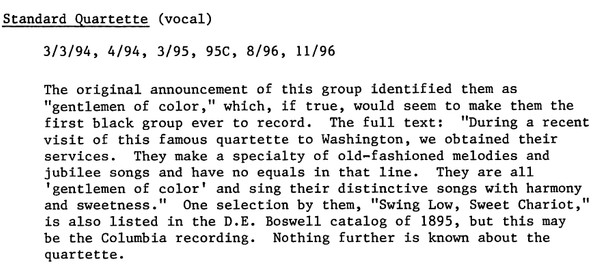Standard Quartette (2)
Настоящее имя: Standard Quartette (2)
Об исполнителе:
The Standard Quartette was a Chicago-based vocal ensemble established circa 1890 and renowned as one of the first African-American groups to release commercial audio records. The group toured the United States, making gramophone wax cylinder recordings for local labels. In August 1891, the Standard Quartet produced their earliest known records for the New York Phonograph Company established by brothers John and Richard Haines in Brooklyn, New York (preceded by Unique Quartette on the same label by only eight months). They again returned to New York Phonograph Co in July 1893, earning a standard $10 fee per session ($340 in today's currency); the specific titles they cut are unknown. In the fall of 1893, the Standard Quartette joined a vaudeville "South Before the War," a prolific theatrical comedy featuring over 60 dancers and actors on stage led by black comedian Billy McClain (1866—1950); notably, it was one of the first mixed-race performing groups in the American history, starring several prolific white vocalists. On the other hand, the show presented a blatantly stereotypical and exploitative portrayal of the supposedly prosperous and careless happy lives of Antebellum South black slaves. In February 1894, when "South Before the War" toured in Washington, DC, the Standard Quartet recorded six titles for Columbia Phonograph Company with their fellow cast member, white operatic soprano Jessie Oliver; only one track survived from these sessions, "Swing Low, Sweet Chariot" recorded without Oliver. In April 1894, the quartet returned to Columbia studios and produced nine more titles — three cylinders survived today, including the earliest known performance of "Poor Mourner." Standard Quartette Ed De Moss — tenor vocal Rufus L. Scott — bass vocal H.C. Williams — vocals William Cottrell — vocals
